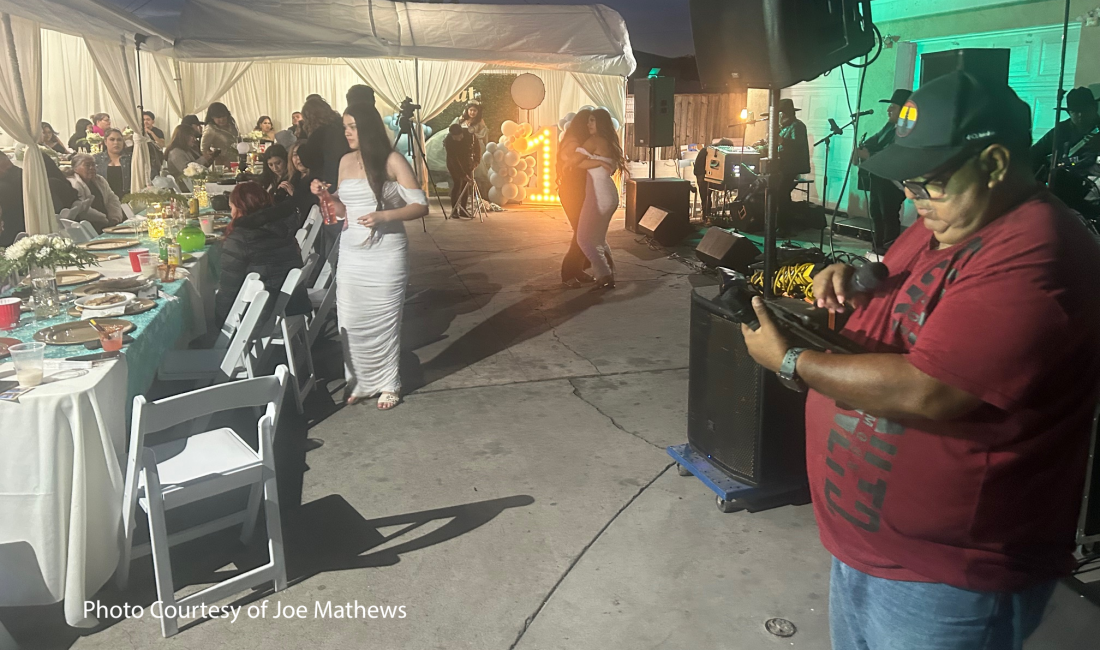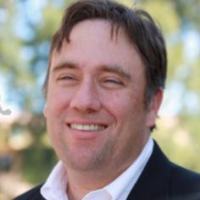Trump Says a Rebellion Started In 2 Small California Cities. I Looked, But Couldn't Find It
This column is co-published with Zócalo Public Square.
On Saturday, I went to a riot and found myself at a quinceañera.
I wasn’t lost. I had headed to the L.A. County cities of Compton and Paramount to see the “riots and looters” that Donald Trump and his administration were talking about on social media. I know those communities well. I spent years covering them for the Los Angeles Times, and I have family history on Compton’s east side: My great-grandparents are interred in the neighborhood where the U.S. government said that violent unrest was taking place.
But try as I might, I couldn’t find any rioting.
Yes, Los Angeles County Sheriff’s deputies were on Alondra Boulevard, along with some people who may have been federal agents (They were wearing dark clothes and masks). The sheriffs had two lines, protecting either side of the stretch of Alondra Boulevard that is home to Paramount’s Home Depot. That store, and an industrial park nearby, had become the focus of a day-long conflict between federal agents, who were accused of seeking to grab undocumented immigrants, and protestors who rushed to the scene. Federal authorities have suggested no raid took place on Home Depot, while community members said they had seen it.
To the east, sheriff’s vehicles were confronting just a few protestors (“stragglers,” in the words of one deputy), pushing them back into the middle of Paramount. There was some yelling but little conflict or tension. I chatted up some protestors at a Jack in the Box.
To the west, the law enforcement lines had crossed the Rubicon—well, the L.A. River and the 710 Freeway, which separate Paramount and Compton—and used vehicles and loud blasts to push back a small group of protestors. By the time I got there, fewer than 100 people were protesting.
This being Compton, with its strong oral culture (it’s famously the hometown of Kendrick Lamar and other hip-hop artists), some of the protestors were mouthy, profane, and provocative. A few were anarchists, dressed in black and wearing masks (just like the feds!). They didn’t help matters by throwing things at the sheriffs and agents.
A block west of the law enforcement line on the Compton side, a burned-out car sat in the middle of the intersection at the corner of Alondra and Atlantic. But people weren’t rioting or doing the large-scale destruction we saw during the 1992 civil unrest. Maybe 400 people milled around. The foolish ones wrote “Fuck ICE” on signs and businesses and the burned car; I say foolish because, though love can be blind, this was not the moment to pursue love-making with ICE agents. Wiser taggers went with “Fuera ICE,” or “Away ICE,” since the departure of these feds would certainly make everyone safer.
I walked up to the law enforcement line, wearing my press pass—and swallowed something that tasted like a mix of tear gas and pepper spray. It had been a couple decades since Los Angeles law enforcement had attacked me in this way back when I was covering immigration protests and anti-police protests for the L.A. Times. A self-described medic, who appeared to be with the anarchists, gave me a rag and some water. I retreated back to interview the larger crowd at Atlantic and Alondra.
Not much was happening there, so I walked around the neighborhood. Two hundred yards in any direction, it was just another Saturday night. I could see people in and outside their homes, enjoying a cool June evening. A short walk up Atlantic, families were relaxing in the park where Richard Williams taught his daughters, Venus and Serena, to play tennis.
I wandered west and then south, passing again near the law enforcement line (where the only people who seemed tense were the sheriffs and masked agents). Less than 200 yards from the Atlantic-Alondra intersections, I saw lights and heard rock and banda music.
Outside hovered several teenage girls and their fathers. It was a party, one man told me. A quinceañera, another said.
“Bro,” said a middle-aged gentleman wearing a Dodger hat, “you OK?”
“I’m good,” I said.
“Your eyes are kind of watery. Let me get you some water.”
I could see fine. I poured a little water from the cold bottle into my eyes and drank the rest. And he asked: “What’s the deal up there?”
I tried to explain.
“Trump is an idiot,” he said. “What else is new?”
Then the father of the girl celebrating her birthday, warmly greeted me and invited me in to the party.
He apologized that the party wasn’t grander—“I don’t have the money to rent a place”—but I told him he didn’t need to. The party was quite spectacular.
It took up two side-by-side apartment building driveways that extended maybe 40 yards in from the street. The neighbors had agreed to move their cars for the night.
The father and his family had put up a white tent, with chandeliers hung from the top. More than 100 people attended. There was a dance floor, where his daughter—the birthday girl—and her girlfriends were moving around. And there was a stage where a terrific band—three guys on guitars—played so loud that you couldn’t hear the sheriffs or the helicopters overhead. They had a photo booth set-up at the entrance with a gold backdrop, like at the Oscars. There was a taco grill.
“Please have some food,” he said. “We have too much.” He ordered me two tacos al pastor. They were off the hook.
Who knew civil war could be so tasty?
Technically, it turned out the party was a Sweet 16, not a quinceañera, for his youngest daughter. This was his second marriage, and he wanted to go all out. He missed his older children, who had moved to Wyoming, where life is cheaper and easier.
He saw no reason to stop the party. As close as we were to the law enforcement lines, we didn’t feel, there in the driveway, that the police actions outside constituted anything like what the White House was officially calling “a rebellion against the authority of the Government of the United States.”
“The government does what the government does,” the father said. “Life goes on.”
After a half-hour of conversation, he excused himself and took his wife out on the dance floor.
Some other guests invited me to dance. I joined in for a little while. If your national government is going to declare you in rebellion, you might as well have a good time.
The party broke up a few hours later, without the help of the National Guard.




